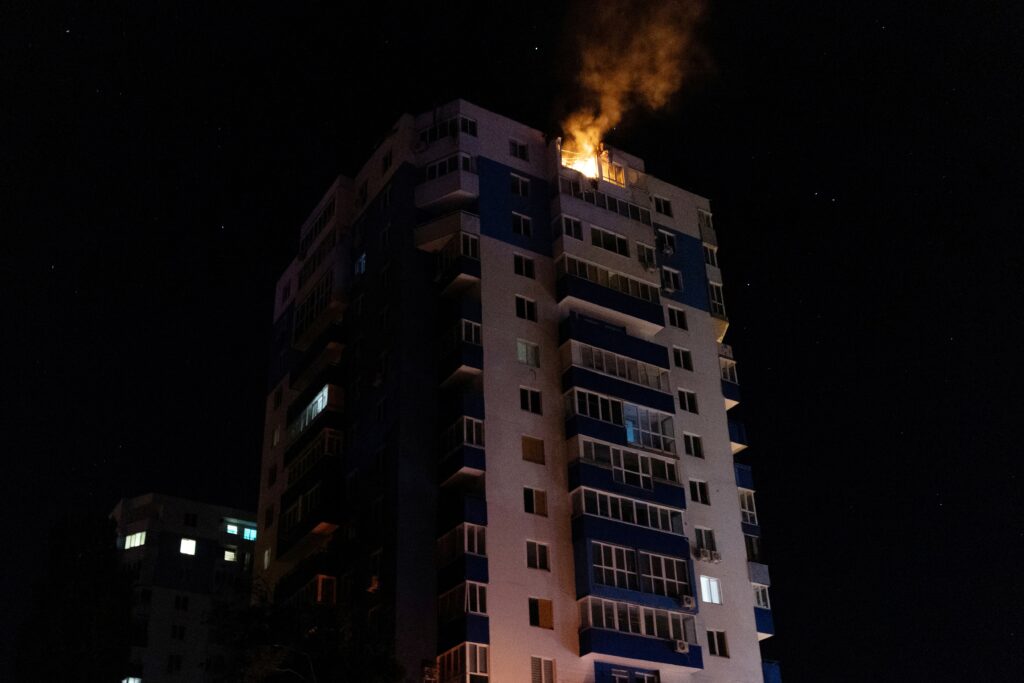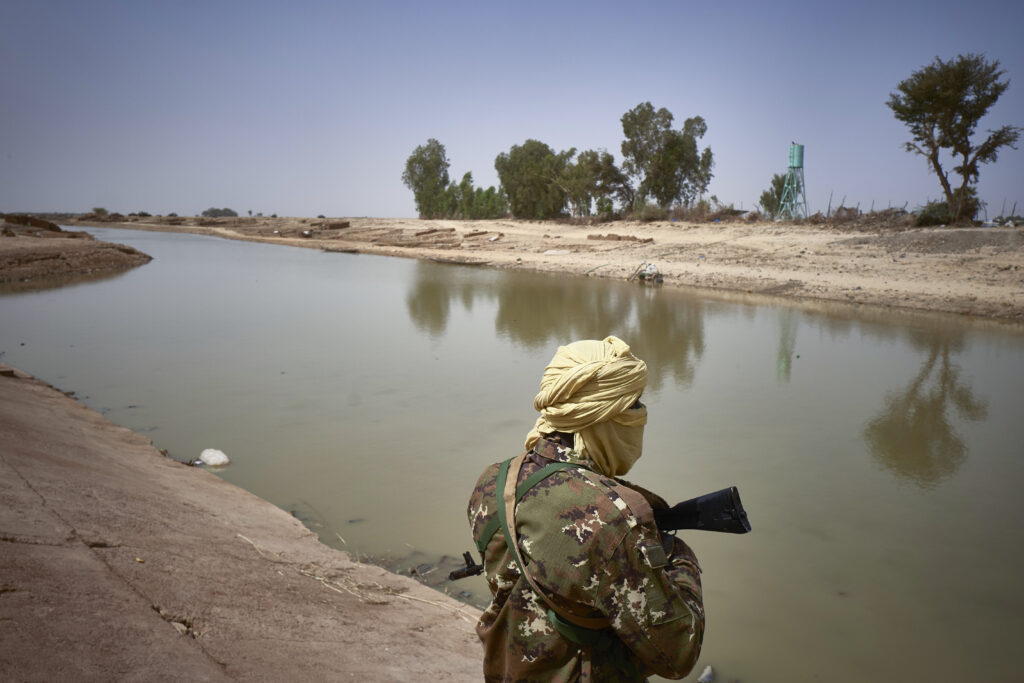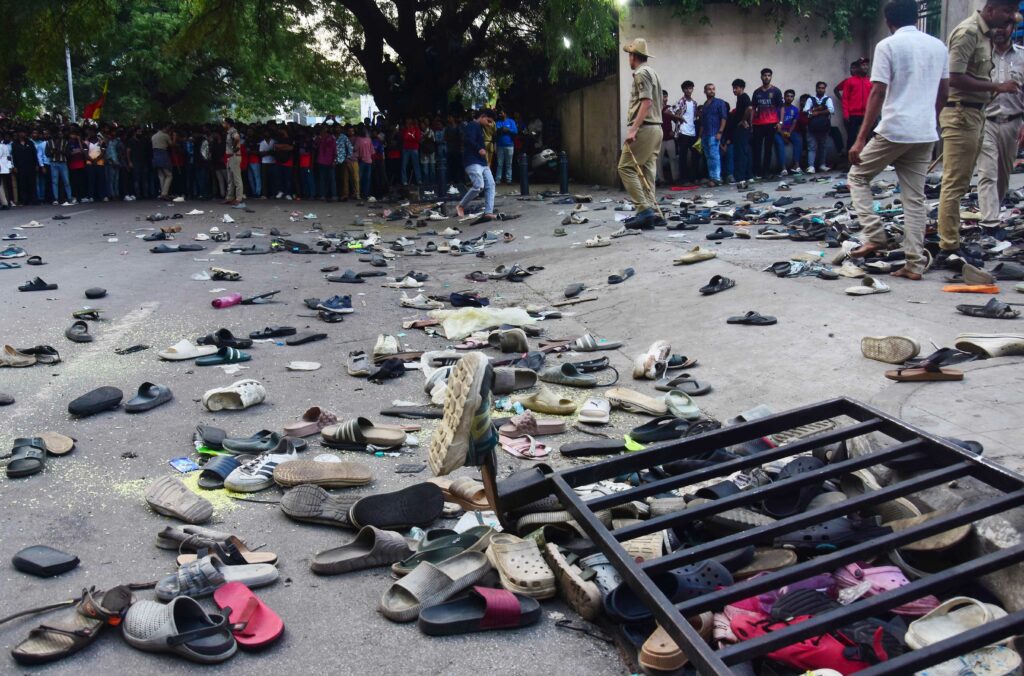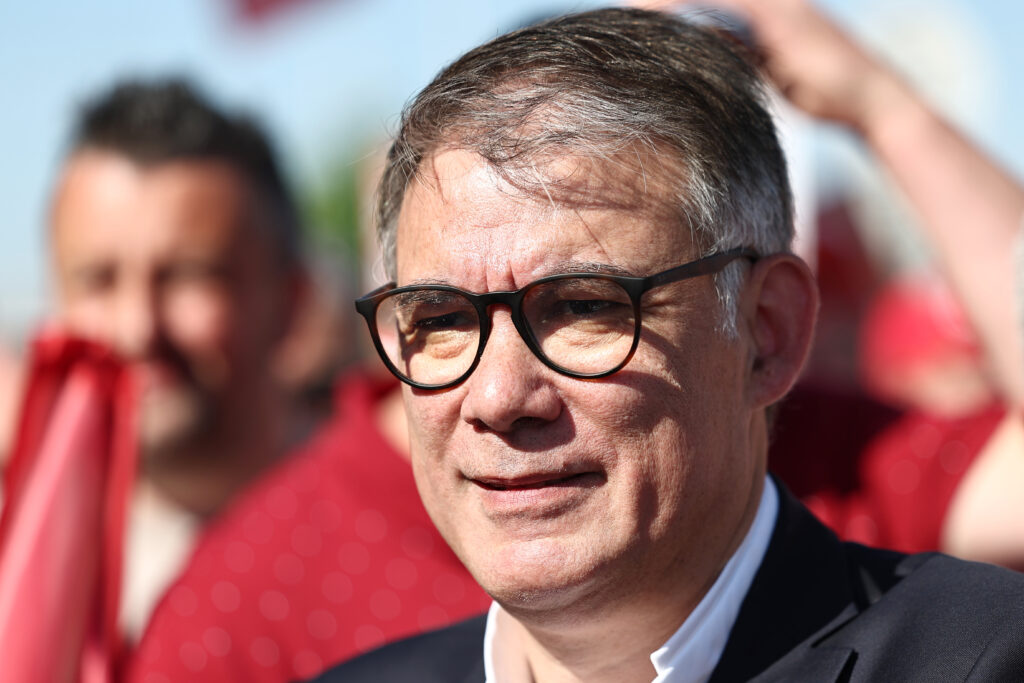La Russie bombarde massivement l’Ukraine, au moins quatre morts à Kiev
La Russie a massivement bombardé l’Ukraine avec des drones et des missiles balistiques dans la nuit de jeudi à vendredi, faisant au moins quatre morts dans la capitale Kiev, quelques jours après l’attaque spectaculaire contre des aérodromes militaires russes.Alors que le Kremlin avait laissé entendre qu’il préparait une riposte, des alertes aériennes ont été déclenchées dans la nuit sur tout le territoire ukrainien et plusieurs régions ont fait état de multiples frappes notamment dans l’ouest, loin de la ligne de front.”Quatre personnes sont confirmées mortes dans la capitale”, a déclaré le maire Vitali Klitschko sur Telegram, après avoir évoqué un bilan d’un mort et 20 blessés dont 16 hospitalisés.Les services d’urgence avaient indiqué auparavant que Kiev avait été la cible d’une “attaque impliquant des drones et missiles balistiques” touchant plusieurs quartiers de la ville.Parmi les dégâts signalés à la suite d’explosions et de chutes de débris, un incendie a éclaté dans un immeuble résidentiel, a précisé la même source.Selon les autorités civiles et militaires de la ville, des voies de métro ont été endommagées par les bombardements russes.La compagnie ferroviaire nationale a fait de son côté état de dégâts sur les rails dans la région, affectant le trafic des trains desservant la périphérie sud de Kiev. Hors de la capitale, plusieurs régions ont fait état d’importants bombardements russes.A Loutsk (ouest), non loin de la frontière polonaise, “une attaque massive de missiles et drones” a “partiellement détruit” un immeuble résidentiel, faisant cinq blessés, selon le chef de l’administration militaire régionale Ivan Rudnytsky sur Telegram. Egalement à l’ouest, la région de Ternopil a subi “l’attaque aérienne la plus massive à ce jour”, avec “de multiples frappes” selon Viatcheslav Negoda, chef de l’administration militaire régionale. Il a fait état plus tard d’un bilan de cinq blessés.”Des installations industrielles et des infrastructures ont été touchées”, a indiqué le maire de Ternopil, Serguiï Nadal. “Certaines parties de Ternopil sont sans électricité et la pression de distribution de l’eau a été réduite en raison des coupures de courant”. Au centre du pays, au bord du fleuve Dniepr, “trois missiles russes ont été abattus sur notre territoire et 22 drones”, a déclaré le gouverneur de la région de Tcherkassy, Igor Taburets, précisant que les frappes n’avaient pas fait de victimes.- Accidents de trains -En Russie, le maire de Moscou Sergueï Sobianine a indiqué que la capitale avait été ciblée par 10 drones ukrainiens dans la nuit.Trois aéroports desservant Moscou ont été fermés provisoirement, selon l’agence chargée du transport aérien, qui a ensuite levé les restrictions.Malgré les appels de l’Ukraine et des Occidentaux au cessez-le-feu immédiat et la pression exercée par Donald Trump pour engager des pourparlers et mettre fin au conflit, les combats ne montrent aucun signe d’apaisement, plus de trois ans après le lancement de l’offensive militaire russe à grande échelle.La Russie contrôle à l’heure actuelle environ 20% de ce pays voisin, dont la Crimée, péninsule annexée en 2014.A l’issue d’un appel avec Vladimir Poutine mercredi, le président américain avait prévenu que Moscou comptait riposter à l’attaque audacieuse lancée le week-end dernier par l’Ukraine contre des bombardiers russes, jusqu’à des milliers de kilomètres de ses frontières.Moscou a également accusé mardi Kiev d’être à l’origine des explosions ayant provoqué le week-end dernier l’effondrement de deux ponts et des accidents de trains qui ont fait sept morts et plus de cent blessés, dont des enfants, dans les régions russes de Koursk et de Briansk, frontalières de l’Ukraine.Dans la nuit de jeudi à vendredi, une locomotive a déraillé dans la région russe de Belgorod, frontalière de l’Ukraine, sans faire de victime, a indiqué la compagnie russe de chemin de fer. Le gouverneur de la région, Viatcheslav Gladkov, a précisé qu’un “engin explosif avait été placé sous les rails”, sur Telegram.Sur le plan diplomatique, deux cycles de négociations menées à Istanbul entre Kiev et Moscou sur une trêve, encouragée par Washington, n’ont pas permis de rapprocher les positions.Au cours de la deuxième réunion, lundi sous médiation turque, la délégation russe a remis à Kiev une liste de demandes comprenant notamment le retrait de ses forces de quatre régions dont Moscou revendique l’annexion, la renonciation de l’Ukraine à intégrer l’Otan et la limitation de la taille de son armée.Des conditions qualifiées mercredi par Volodymyr Zelensky d'”ultimatums” inacceptables.Seul résultat de ces discussions: Russes et Ukrainiens doivent procéder ce week-end à un nouvel échange de 500 prisonniers de guerre de chaque camp, après un précédent échange de 1.000 personnes de chaque côté en mai. Kiev et Moscou sont en outre convenus de remettre les corps de milliers de militaires tués.En visite à Washington jeudi, le chancelier allemand Friedrich Merz a plaidé auprès de Donald Trump pour “accroître la pression sur la Russie” pour l’amener à mettre fin à la guerre.






